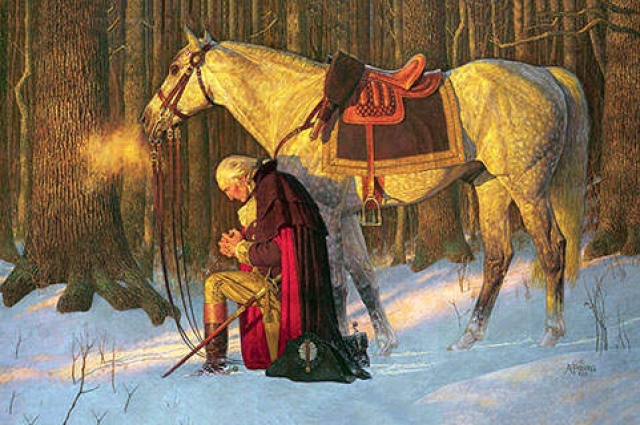God and Government

Editor's Note: This is a reprint of an article that ran last Christmas. We think it still serves as a timely reminder.
President Thomas Jefferson penned his letter to the Danbury Baptists describing a wall of separation between church and state on January 1, 1802.
Two days later he attended church inside the U.S. Capitol.
In the House of Representatives.
No heads exploded because there was no ACLU yet.
How times have changed.
Here in the Ohio Statehouse, Christmas seems an appropriate time to reflect on the relationship between church and state, as well as God and government.
Jefferson must have had a very different understanding of his famous wall than the one embraced by today’s left. Because, according to the Library of Congress, during his presidency “the state became the church.”
The state also became the church during the presidency of James Madison, as the author of the First Amendment (and, of course, the Establishment Clause) followed Jefferson’s example of attending religious services in the Capitol.
In fact, the U.S. Capitol served as one of the most popular churches in the nation for seven decades.
• Christian church services were held in the House of Representatives from 1800 to 1868, mostly in the room now called Statuary Hall.
• The Senate and House both approved of the Capitol services.
• Members of Congress were regular attendees.
• Jefferson had a designated seat and was so devoted to the services he would attend even in the worst weather.
• The House Speaker's podium was used as the preacher's pulpit.
• The Gospel was even preached in the Supreme Court chambers.
• Church services inside the state were so popular, Jefferson permitted them inside a variety of government buildings including the Treasury and War Department.
• Services of every Protestant denomination were held.
• The popularity of the Capitol church lasted so long that even President Abraham Lincoln attended services.
So, how do we square Jefferson’s words with his actions?
According to the Library of Congress, the Capitol church services “were acceptable to Jefferson because they were nondiscriminatory and voluntary.”
Jefferson opposed a “national” religion. He did not oppose a religious nation. Or a religious government. He opposed a government religion.
The difference is critical.
Jefferson’s actions prove his wall wasn’t meant to divide the church and state – it was meant to protect them from each other. To protect one from coercing the other.
The left’s modern interpretation of Jefferson’s wall is that it is meant to protect the state from the church. The Founders’ understanding appears to have been just the opposite. They had good reason to protect the church from the state. The nation was settled as a place of refuge for those facing religious persecution by the state.
Jefferson obviously held the church in high regard. He did not much care for government.
“The natural progress of things is for liberty to yield, and government to gain ground,” wrote Jefferson in 1788.
He certainly found religion preferable to government as a moral compass, writing in 1813, “[O]f all the systems of morality ancient or modern, which have come under my observation, none appear to me so pure as that of Jesus.”
As we count the blessings this year has brought, and as we prepare to embark upon a new year, it may be worthwhile to reflect upon the words of the Founders on this subject.
It is not difficult to conclude they would have been aghast at the wall of separation we have built between God and government.
“Our constitution was made only for a moral and religious people. It is wholly inadequate to the government of any other. Morality and virtue are the foundation of our republic and necessary for a society to be free.” – John Adams in a letter to the Massachusetts Militia in 1798.
“Of all the dispositions and habits which lead to political prosperity, religion and morality are indispensable supports. In vain would that man claim the tribute of patriotism, who should labor to subvert these great pillars of human happiness, these firmest props of the duties of men and citizens.... Whatever may be conceded to the influence of refined education on minds of peculiar structure, reason and experience both forbid us to expect that national morality can prevail in exclusion of religious principle. “ George Washington’s Farewell Address in 1796.
Garth Kant is Senior Press Secretary of the Ohio Senate Majority Caucus and the editor of On The Record.
